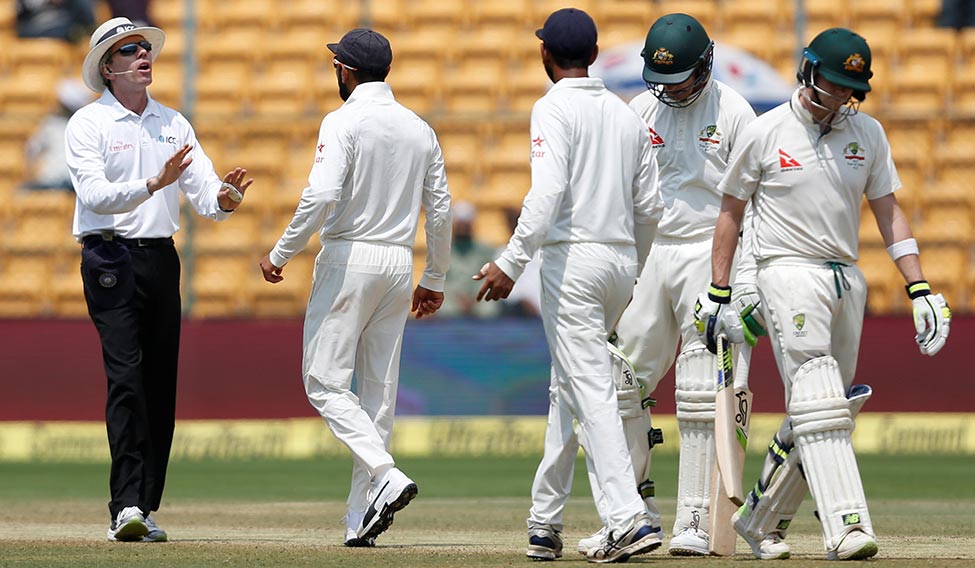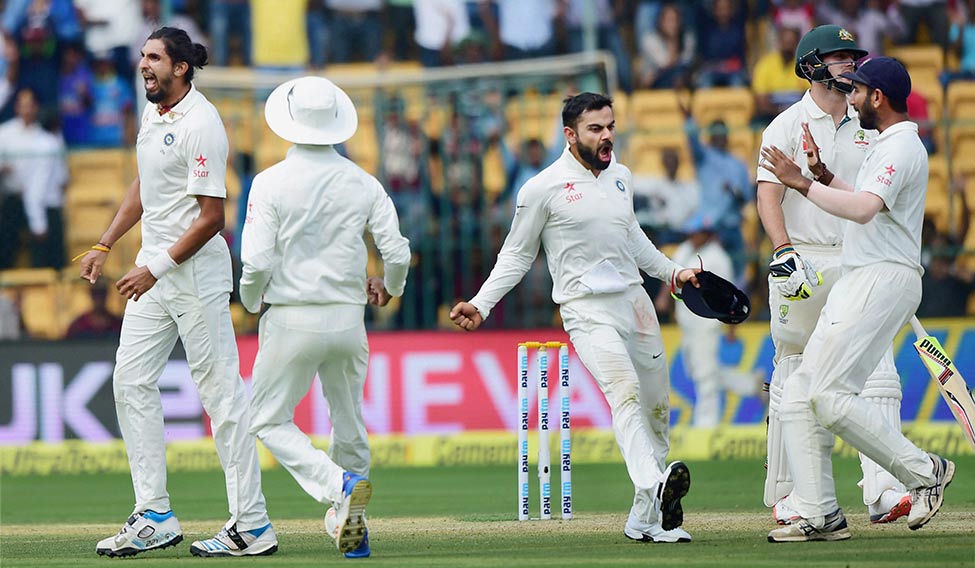As India scripted a spirited comeback to win the second Test against Australia in Bengaluru by 75 runs, the spotlight wasn’t on K.L. Rahul, the man of the match, or on Ravichandran Ashwin, who got his 25th five-wicket haul in Tests. It was on the Decision Review System and the two captains—Virat Kohli and Steven Smith.
The two teams were a study in contrast after the match. India, high on intent and full of aggression on field, left the Chinnaswamy Stadium soon after the post-match news conference. At the hotel, the staff lined up to welcome the victors, and it was time for celebration. The Aussies, on the other hand, stayed back in the dressing room, long after the sun had set, thinking of the match, about letting India in, and about provoking Kohli. As part of their blueprint for the India tour, the last was a strict no-no.
After the win, Kohli tore into Smith, accusing him of cheating—the latter had tried to consult his dressing room on whether to go for a review after he was adjudged leg before wicket in the second innings. As per ICC rules, this is not allowed. Though Smith said he shouldn’t have done it and that it was “brain fade”, Kohli shot back, saying the Aussies had attempted the same twice before. “We had observed that, and we told the match referee and the umpire that it had been happening for the last three days and it had to stop,” said Kohli. “There is a line you don’t cross on a cricket field. Sledging and playing on the opponent’s mind are different. I don’t want to mention the word, but it falls in that bracket. I would never do something like this on the cricket field.” Kohli had not only regained his roar, but also succeeded in pushing Australia onto the back foot.
The DRS controversy has become the flashpoint between the two teams. Cricket Australia swung into rearguard action, backing Smith, while coach Darren Lehmann dismissed the allegations. The Board of Control for Cricket in India, led by Vinod Rai, chairman of the Committee of Administrators, backed Kohli’s claims. Match referee Chris Broad had allegedly assured the Australian team management that it would be a “non-issue”. This, reportedly, compelled BCCI CEO Rahul Johri to write to the International Cricket Council, asking it to take note of the matter.
India found its mojo on day two of the Test. After falling cheaply on the first day, the team fought hard, hung on and contained the Australian batsmen in their first innings. Kohli had urged his teammates to show intent, and it started to seep through on day two. By day three, the Indian batsmen, led by Rahul’s positive 51, had regained their confidence. Cheteshwar Pujara scored a controlled 92 and Ajinkya Rahane got a fighting 52—the two added a crucial 118 runs for the fifth wicket.
Kohli had also insisted on team unity, in both good and bad times, and the team stuck together. It was not easy. The players had gone through many Test series and their toughest challenge had arrived at the fag end of the season. “Yes, the last seven to eight days have been challenging,” said Kohli. “But, I said only one thing—we will win together and lose together.”
After the Pune Test, in which India fell to spin, the batting department had a detailed discussion on how to tackle the spinners. “The batting group got together and we had a chat on how our approach had been,” said batting coach Sanjay Bangar. “We looked to the past to see how we negotiated spin and the areas we could have adapted better in the first three innings. It was a good chat and we came out with solutions. The batsmen really applied themselves, used their feet well and were trying to get to the pitch of the ball as much as they could. They were also playing on the back foot. All in all, they put up a better show than what they had in the first three innings.”
 Out, no doubt: Kohli speaks to the umpire as Smith (far right) walks off after his dismissal | Reuters
Out, no doubt: Kohli speaks to the umpire as Smith (far right) walks off after his dismissal | Reuters
Rahane, who had been under pressure for his poor show against spin in the Pune Test, had a special chat with his coach, former Indian opener Pravin Amre. After the Bengaluru win, a relieved Amre praised Rahane’s skill and ability to adapt. “In the first innings, I thought he was in control, [right] before he played the wrong shot [and got stumped],” said Amre. “He was aware this match was crucial for him and his team. We spoke about Ajinkya trusting his defence. On such wickets, batting for 150 balls to get 50 is critical. There is a thin line between being aggressive and being too aggressive. He backed his sweep shot and managed Nathan Lyon very well. On wickets like these, you need very high levels of concentration. Every run is gold; personal milestones are not important. He always had the skill to handle spin. The key was footwork.”
The target of 188 set for Australia was challenging on a dry, spinning pitch. The bowlers were quick off the blocks, bowling a precise length and tight lines. The medium pacer duo of Ishant Sharma and Umesh Yadav struck at the Aussie top order, paving the way for spinners Ravindra Jadeja and Ashwin to get in on the action. Jadeja was miserly—he bowled 8 overs, including 5 maidens, and picked up 1 wicket. He gave way only 3 runs. At the other end, Ashwin exploited the pitch and bowled a dream spell. In 12.4 overs, he conceded 41 runs and took six wickets. India’s fielding, which was wanting in Pune, shone through in Bengaluru. But, it was the bowlers, said Kohli, who set the game up for India on day two. “In the first session on day two, we gave away only 45-odd runs and picked up two wickets when they could have taken the game away from us—they were 40 without loss [overnight],” said Kohli. “I think that was probably the momentum change that we needed, and throughout the day we didn’t give more than 200 runs, and we picked up six wickets.”
The DRS has been an important factor throughout the series. While India, a new user of the system, has fared poorly with its reviews, Australia has been judicious. Before the DRS was introduced, said Kohli, the benefit of the doubt, in case of dismissals, went to the batsman. That does not seem to be the case now, he said. Kohli’s success rate with the DRS has been poor and India has taken reviews as a knee-jerk reaction. On day two in Bengaluru, Ashwin reviewed two decisions within six overs. Both reviews were unsuccessful. In the first innings, Kohli had asked for a review, when he was clearly out, and it predictably backfired. “We have not been that consistent with taking the right DRS calls, and I think we need to get better with that,” said Kohli. “But, we take our decisions on the field ourselves. We don’t ask for confirmation upstairs, so I think that’s one thing that’s pretty consistent with us.”
The on-field acrimony notwithstanding, Bengaluru gave Kohli his sweet sixteen—his 16th win as Test captain, that is. And, he ranks this win as his best. “This was the sweetest victory for us,” he said.







